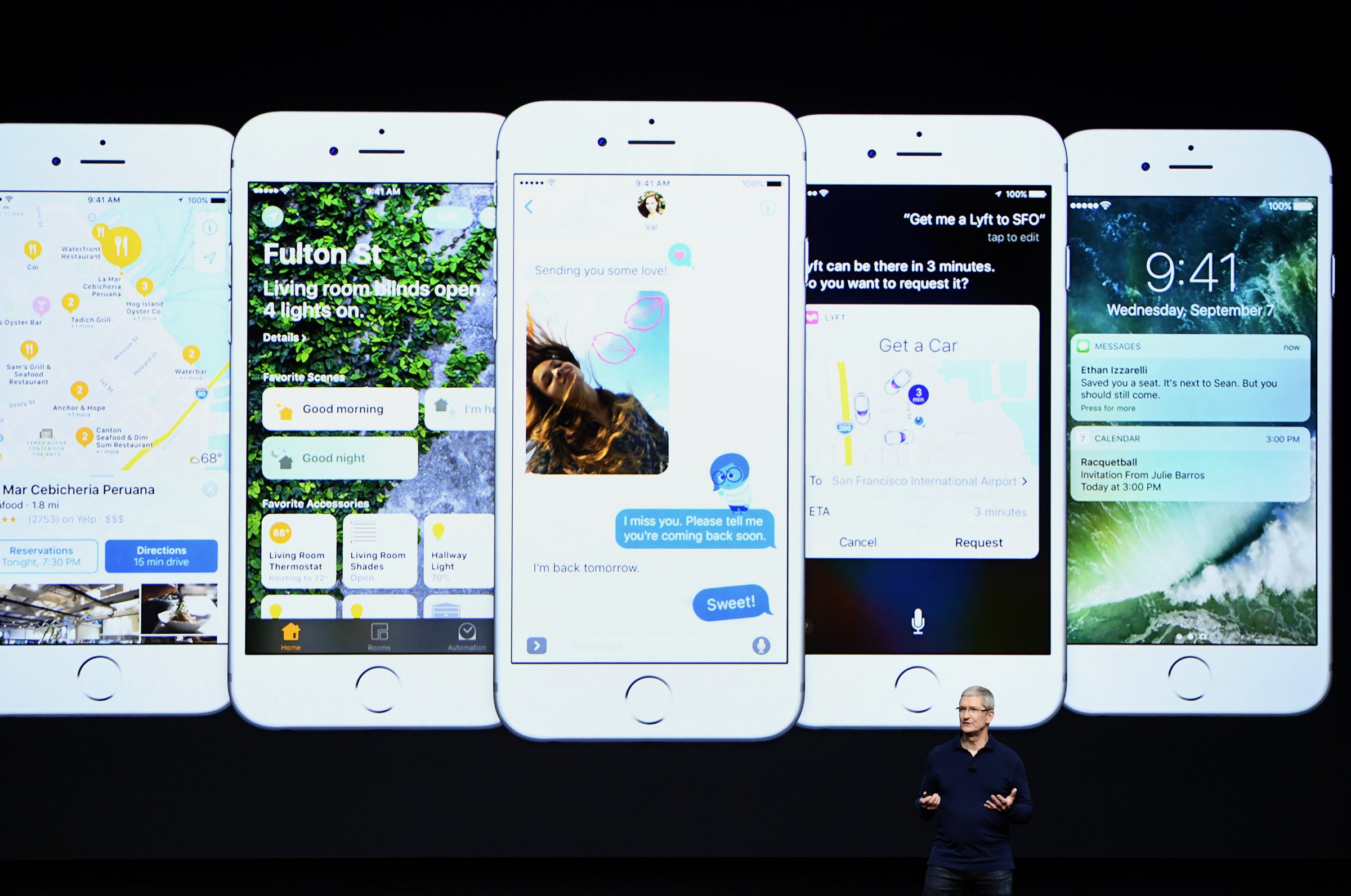
When Apple chief executive Tim Cook took the stage on Wednesday to introduce its new iPhones to the world, buzzy features like the phones’ new water resistant design, improved camera and, controversially, lack of a headphone jack stole the show. It wasn’t until the company’s two-hour keynote nearly ended that it revealed a crucial detail about its new smartphones: The cheapest version of the iPhone 7 and 7 Plus will come with 32GB of storage instead of 16GB.
It’s a seemingly insignificant detail. But it’s an unexpectedly consumer-friendly move suggesting that the company is finally listening to observers who have long lamented Apple’s choice to sell an iPhone with such a small amount of storage.
With one exception, the cheapest iPhones have had 16GB of storage since the iPhone 3GS launched in 2009. Such a paltry amount, critics say, is nary enough given all the photos, videos and other content we record and store on our phones these days. (That the iPhone’s operating system eats away some of this storage space right off the bat only adds to this problem.)
But until now, Apple argued that 16GB was sufficient enough storage for some users thanks to services like iCloud and Dropbox, which help users keep their files in far-away servers rather on than their phones. Here’s what Apple marketing boss Phil Schiller told technology blogger John Gruber last year, according to The Verge:
“The belief is more and more as we use iCloud services for documents and our photos and videos and music that perhaps the most price-conscious customers are able to live in an environment where they don’t need gobs of local storage because these services are lightening the load.”
Apple’s decision to kill off 16GB iPhones shows the company is acknowledging the difficulty of living with that amount of storage space. It’s a doubly sensical move in that the models unveiled Wednesday take higher resolution photos, which demand more storage space. (Apple is still selling a 16GB version of its smaller iPhone SE.)
Apple made another atypical move during Wednesday’s event. While the latest iPhones lack a standard headphone jack (ostensibly to make the phone more water resistant) the company opted to package them with an adapter allowing shoppers to use their old headphones with the new devices. That’s a surprisingly decision from a company that has a long history of being stubborn with standards, ports and cables. Apple’s 12-inch MacBook, for instance, features only a single USB Type-C port, a technology that promises faster speeds and other benefits but has yet to be widely adopted. Decades earlier, Apple released its first iMac without a floppy disk drive, a risky move in an era before CDs became the dominant medium.
That said, Apple executives sound committed to blowing up standards when they see fit — Schiller cited Apple’s “courage to move on” while explaining the iPhone 7’s lack of a headphone jack. Apple’s choice to remove that jack is no small gesture, given its ubiquity across devices. That Apple ditched the headphone jack while simultaneously announcing a new pair of wireless earbuds may hint the company wants to move towards a future where more of our devices communicate wirelessly, eliminating the need for cumbersome cables. The crucial difference this time is that Apple realizes not everybody is ready to give up their old headphones, even if it thinks wireless is the future. That’s a marked difference from Apple’s approach with the MacBook, buyers of which needed extra accessories to use their new laptop with older gear.
Decisions like increasing the iPhone’s minimum storage space and making it slightly easier for consumers to adapt to a changing hardware experience may seem inconsequential. But even these minor moves may help Apple at a critical time. iPhone sales are dropping for the first time in the device’s history, a big problem given the device is Apple’s chief moneymaker. Apple’s rivals, meanwhile, have been offering increasingly attractive devices with features not found on the iPhone, like quick charging and upgradable storage space. Any tweaks that help Apple fend off the competition, however small, may prove helpful down the road.
More Must-Reads From TIME
- The 100 Most Influential People of 2024
- The Revolution of Yulia Navalnaya
- 6 Compliments That Land Every Time
- What's the Deal With the Bitcoin Halving?
- If You're Dating Right Now , You're Brave: Column
- The AI That Could Heal a Divided Internet
- Fallout Is a Brilliant Model for the Future of Video Game Adaptations
- Want Weekly Recs on What to Watch, Read, and More? Sign Up for Worth Your Time
Contact us at letters@time.com